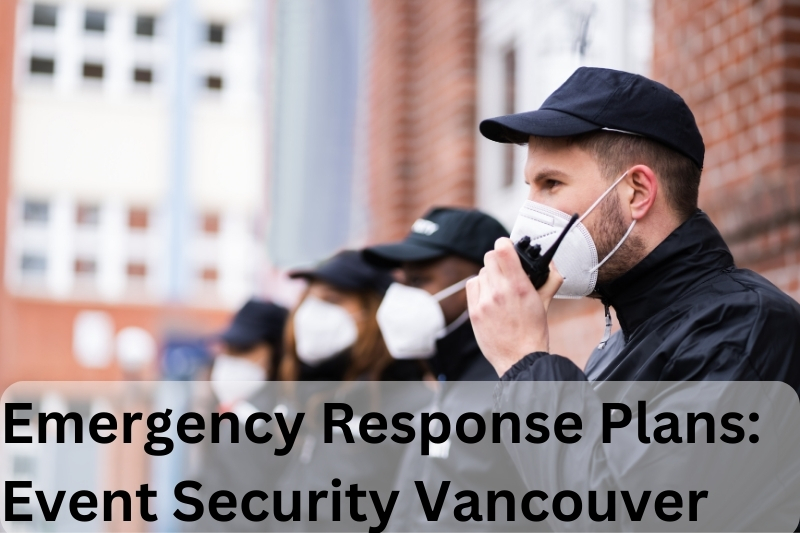Emergency Response Plans: Safeguarding Vancouver’s Events and Gatherings
Event planning is a highly complex process that requires meticulous planning and attention to detail. It involves coordinating various vendors, ensuring the safety of attendees, and adhering to strict timelines. However, despite all efforts, unforeseen circumstances can still occur and disrupt an otherwise successful event. This is where emergency response plans come into play.
Emergency response plans are essential for safeguarding Vancouver’s events and gatherings. These plans outline the necessary steps to be taken in case of an emergency, such as a natural disaster, medical emergency, or security threat. They ensure that event organizers are prepared to handle any situation that may arise and minimize potential harm to attendees.
Understanding the Importance of Emergency Response Plans
In the bustling city of Vancouver, there are always exciting events and gatherings happening. From music festivals to food fairs, these events attract large crowds and create memorable experiences for attendees. However, with a large number of people in one place, it is crucial to have proper emergency response plans in place to ensure the safety and security of everyone involved.
An emergency response plan is a detailed and organized set of procedures to be followed in the event of an emergency. It outlines roles and responsibilities, communication protocols, evacuation routes, and other necessary actions to address potential emergencies. Having a well-defined plan can save lives and minimize damage in case of unforeseen circumstances.
Assessing Vulnerabilities: Event-Specific Security Considerations
When creating an emergency response plan, it is essential to assess the vulnerabilities and potential risks associated with a particular event. Different types of events will have different security considerations. For example, a music festival may face potential safety threats related to large crowds, while a food fair may face concerns regarding food poisoning or allergies.
Understanding these specific vulnerabilities can help in developing appropriate emergency response plans. It is crucial to involve all stakeholders, including event organizers, security personnel, and local authorities in this process. Together they can identify and address potential risks to ensure the safety of attendees.

Key Elements of Effective Emergency Response Strategies
An effective emergency response plan should include the following key elements:
Clear Communication Protocols:
In case of an emergency, clear communication is vital for prompt and efficient response. The plan should include designated methods of communication, such as walkie-talkies or phone numbers.
Trained Personnel:
It is crucial to have trained personnel on-site who can handle emergencies and provide first aid if necessary. Event staff and security security guards services in emergency should receive appropriate training in emergency response procedures.
Evacuation Routes:
In the event of an emergency, people must be able to evacuate quickly and safely. The plan should include clearly marked evacuation routes and designated meeting points for attendees.
Emergency Supplies:
It is essential to have necessary emergency supplies on hand, such as first aid kits, fire extinguishers, and emergency lights. These supplies should be easily accessible to event staff.
Contingency Plans:
In some cases, emergencies may require a different approach than what was initially planned for. It is crucial to have contingency plans in place for various scenarios that could arise.
Collaboration with Local Authorities:
Event organizers should collaborate with local authorities, such as police and fire departments, to ensure a coordinated response in case of an emergency.
Regular Training and Drills: It is essential to conduct regular training sessions and drills to test the effectiveness of the emergency response plan. This practice will also help personnel become more familiar with their roles and responsibilities during an emergency.
Post-Emergency Evaluation:
After an emergency has occurred, it is crucial to conduct a post-emergency evaluation. This evaluation should identify any shortcomings in the response plan and address them as needed.
Communication with Attendees:
During an emergency, event organizers must communicate clearly and effectively with attendees. This can be accomplished through announcements, signage, and designated personnel directing attendees to follow the emergency procedures.
Stay Calm:
In the event of an emergency, it is important for event staff to remain calm and provide reassurance to attendees. Panic can escalate a situation, so remaining calm and composed will help in managing the emergency effectively.
Follow-Up Communication:
After the emergency has been resolved, it is important to communicate with attendees about what happened and any necessary follow-up actions. This will help to maintain trust and transparency with attendees.
Collaborative Preparedness: Stakeholder Involvement and Coordination
In addition to collaborating with local authorities, event organizers should also involve other stakeholders in the emergency preparedness process. This can include venue staff, vendors, and event attendees.
By involving all parties in the planning and coordination process, everyone will have a clear understanding of their roles and responsibilities in case of an emergency. This will help to ensure a coordinated response and minimize confusion during a high-stress situation.
Stakeholder involvement can also provide valuable insights and perspectives, allowing for a more comprehensive emergency response plan. Regular communication and collaboration with stakeholders should be maintained throughout the planning process to ensure everyone is on the same page.
In addition to involving stakeholders in the preparedness phase, it may also be beneficial to conduct mock emergency drills or exercises. This will allow all parties to practice their roles and identify any areas that may need improvement.
Overall, a collaborative approach to emergency preparedness can help event organizers create a more effective and efficient response to any unforeseen situations. It is important for all stakeholders to be involved in the process and for regular communication and coordination to be maintained. By working together, the safety of everyone involved in an event can be better ensured.
So, it is crucial for event organizers to prioritize stakeholder involvement and coordination in their emergency preparedness plans. Let’s continue working together to create a safer environment for all.

Case Studies: Successful Emergency Response in Vancouver Events
To further illustrate the importance of stakeholder involvement and collaboration in emergency preparedness, here are some real-world examples from events held in Vancouver, Canada.
2010 Winter Olympics
During the 2010 Winter Olympics, a collaborative approach to emergency preparedness proved crucial in successfully managing potential risks and threats. The organizing committee worked closely with local authorities, venue staff, and emergency services to develop a comprehensive response plan.
This included regular communication and coordination, as well as conducting mock drills and exercises.
Thanks to this proactive approach, the Winter Olympics were able to handle various emergencies, including a bus accident and a small plane crash, with minimal disruption to the event and without any major injuries.
Implementing Protocols: Training and Drills for Event Safety
One of the key measures taken by event organizers to ensure a successful emergency response is conducting training and drills for all stakeholders involved. These protocols serve as a way to familiarize everyone with their roles and responsibilities in an emergency situation.
For example, at large-scale events like music festivals, staff are trained in first aid and crowd management, while security personnel are trained in identifying potential threats and handling emergencies. Regular drills are also conducted to ensure everyone is prepared and can respond quickly and effectively in case of an actual emergency.
Communication Protocols During Crisis: Ensuring Attendee Safety
In addition to training and drills, effective communication protocols are crucial in ensuring the safety of event attendees during a crisis. This includes establishing clear lines of communication between event staff, emergency services, and attendees.
At the 2010 Winter Olympics, a centralized command center was set up to monitor and coordinate emergency response efforts. This allowed for quick and efficient communication and decision-making during emergencies.
Leveraging Technology: Tools for Enhancing Event Security
Advancements in technology have also greatly enhanced event security and emergency response capabilities. For instance, event organizers can use real-time tracking systems to keep track of attendees and quickly locate them in case of an emergency.
Other technological tools such as surveillance cameras and mobile apps for attendees to report any issues or emergencies have also proved to be effective in ensuring event safety.
Regulatory Compliance: Meeting Vancouver’s Safety Standards
When hosting an event in Vancouver, organizers need to comply with the city’s safety standards and regulations. This includes obtaining necessary permits and licenses, conducting thorough risk assessments, and adhering to fire and building codes.
Vancouver also has a dedicated Special Events Office that works closely with event organizers to ensure all safety requirements are met. By following these regulations, events can ensure the safety of attendees and avoid potential legal issues.
Conclusion
In conclusion, ensuring attendee safety during a crisis is a top priority for event organizers. This involves proper training, effective communication protocols, leveraging technology, and complying with safety standards and regulations. By taking these steps, events can minimize the risk of emergencies and ensure the well-being of all attendees. As event technology continues to evolve and new safety measures are implemented, the safety of event attendees will only continue to improve. So, event organizers need to stay informed and up-to-date on the latest resources and strategies for enhancing event security.
Choose Securiway Event Security Services
At Securiway, we understand the importance of safety and security at events. That’s why we offer a range of event security services tailored to meet the specific needs of our clients. Our experienced team is trained in emergency response, crowd control, and risk assessment to ensure that your event runs smoothly and safely.
Contact us today to learn more about how we can help make your event a success. Remember, safety first! So, don’t hesitate to invest in the necessary security measures to ensure the well-being of all attendees at your next event. Trust Securiway for reliable and professional event security services. Thank you for reading!





Comments are closed.